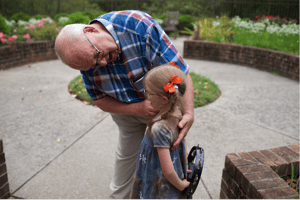 No matter how many times we’ve gone through it in our lives, adjusting to daylight savings time can be difficult for the first few days.
No matter how many times we’ve gone through it in our lives, adjusting to daylight savings time can be difficult for the first few days.
The adjustment can be even more difficult for someone experiencing confusion and disorientation on a daily basis due to Alzheimer’s or dementia.
The change in time throws off our body’s internal clock. Our internal clock is what tells us when it’s time to sleep, wake up and eat. This is affected by environmental cues like sunlight and temperature, which is why when it starts getting dark early, we can start to feel hungry for dinner when it’s only 4:30pm, or we might feel ready for bed much earlier than we would normally go to sleep.
While the typical person is able to make adjustments and be back to their normal schedule within a few days, it is not as easy for someone suffering from Alzheimer’s. These individuals commonly experience something called Sundowning. Sundowning is “late-day confusion” where in which their symptoms may be worse than they typically are during the day. Along with confusion, they may exhibit agitation, restlessness, irritability, disorientation and frustration.
There are a few ways in which you can help to reset your loved one’s internal clock and ease their Sundowning symptoms:
- Increase light in the home. Especially during late afternoon into early evening, turn on as many lights as you can in order to make the home bright.
- Have them participate in activities throughout the day so they will be ready for bed at night and will have a better rest.
- Limit daytime napping. Although your loved one may really want to sleep during the day, avoid it as best as you can. Naps during the day can make it more difficult for them to fall asleep at night and can lead to a broken sleep cycle.
- Offer physical activity and exercise mid-to-late afternoon, this can increase the person’s mood, especially as it gets closer to sunset. However, make sure you do not offer these activities less than 4 hours before their bedtime as it could affect their ability to sleep.
It can be a challenge, but with patience and practice, it is possible to help your loved one adjust their schedule to daylight savings time. Be aware of any other needs they may have that could be adding to their Sundown syndrome. In time, both you and your loved one will be back to your normal routine.
For More Information: Download Our Free Ebook
11 Ways a Life Plan Community Can Improve Your Life





